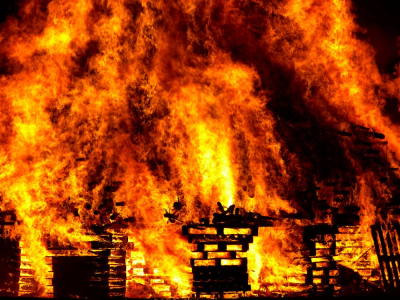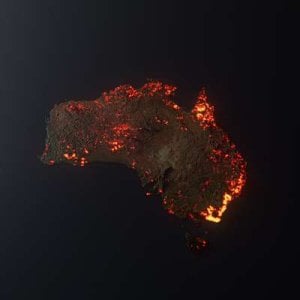‘Nowhere to hide’: Fire expert’s chilling warning for Australian suburbs
By
Maan
- Replies 23
Bushfires have long been a natural part of the landscape, but recent events have highlighted a growing threat that could strike closer to home than many realise.
As cities across the globe grapple with increasingly severe conditions, experts are raising alarm bells about vulnerabilities lurking in urban areas.
What emerges is a chilling picture of unprepared communities and the dire consequences that could unfold in the face of such disasters.
An expert has issued a stark warning that bushfires like the devastating ones currently ravaging Los Angeles, could occur in Australia’s major cities due to insufficient planning.
The Californian fires have claimed five lives so far and destroyed countless properties.
Authorities ordered more than 100,000 people to evacuate, with another 100,000 on standby, as firefighters battled at least five major fires under extreme conditions.
The flames reached suburban areas, including the affluent Pacific Palisades, where celebrity homes were reduced to ash.
Professor David Bowman, a pyrogeography and fire science expert from the University of Tasmania, warned that Australian suburbs are not immune to such destruction.
‘Could something similar happen in major Australian cities – and how prepared are we? The answers are: yes, and not very,’ he wrote.
Australian cities like Sydney and Melbourne have mountain ranges near urban areas, which can create downslope winds capable of driving fires into populated zones.
‘There is the possibility for fires to burn into Australian suburbs. It happened in Canberra in 2003.
‘And it could happen again in a major city such as Sydney or Melbourne. We have all the ingredients.’
While Australia lacks California’s strong Santa Ana winds, downslope winds from mountain ranges pose similar risks.
Professor Bowman noted that older homes with established gardens face higher risks compared to modern housing, which is often better designed to resist ember attacks.
‘If you have more modern housing stock (which is usually better at defending against ember attack), and the houses are more spaced apart and the gardens are clearer, then you might be OK.’
Suburban areas need clearer gardens, better spacing between homes, and firebreaks to reduce risks.
Fire safety messaging, often targeted at rural areas, must extend to suburban communities.
He suggested cities create ‘places of last resort’, similar to those in rural regions, where residents can seek refuge when all other bushfire plans fail.
‘The LA tragedy shows we also need these places in cities.’
Professor Bowman emphasised that people must plan for evacuations by taking essentials like food, water, medicines, and provisions for pets.
Residents in fire-prone areas should also consider installing specially designed fire shelters if affordable.
Thousands of homes in California have already been lost, though the full extent of the damage remains unclear as fires continue to burn.
When fires reach urban areas, ‘house-to-house ignition’, where buildings fuel the blaze, becomes the worst-case scenario.
‘The other frightening dimension is what happens if water supplies run out, which is reportedly happening in some parts of Los Angeles,’ he explained.
Global warming has made Australian bushfires more frequent and severe, leading to higher home insurance costs, affecting the cost of living and the economy.
‘The LA fires show when it comes to climate change, there’s nowhere to hide,’ he shared.
‘Around the world, authorities and communities must overhaul their assumptions about bushfire risk and preparedness. That includes people living in cities.’
A new wildfire erupted in LA’s Hollywood Hills on Wednesday evening, forcing the evacuation of Hollywood Boulevard and putting another 100,000 residents on alert.
Although some smaller fires across California have been contained, others continue to burn, exacerbated by gusty winds and dry conditions.
Australia has experienced some of its most catastrophic bushfires in recent years.
The Black Summer fires of 2019–2020 resulted in at least 34 deaths, 3,000 destroyed buildings, and the loss or displacement of about 3 billion animals.
The Black Saturday fires in 2009 killed 173 people and scorched 450,000 hectares of land.
A composite image from NASA satellite data depicted areas of Australia burned during December 2019 and January 2020.
‘Scale is a little exaggerated due to the render’s glow, but generally true to the info from the NASA website,’ said Anthony Hearsey, the creator of the image.
The recent devastation in Los Angeles serves as a stark reminder of the urgent need for better planning and preparation in urban areas worldwide.

What are your thoughts on how we can better safeguard our urban areas from future fires? We’d love to hear your ideas in the comments.
As cities across the globe grapple with increasingly severe conditions, experts are raising alarm bells about vulnerabilities lurking in urban areas.
What emerges is a chilling picture of unprepared communities and the dire consequences that could unfold in the face of such disasters.
An expert has issued a stark warning that bushfires like the devastating ones currently ravaging Los Angeles, could occur in Australia’s major cities due to insufficient planning.
The Californian fires have claimed five lives so far and destroyed countless properties.
Authorities ordered more than 100,000 people to evacuate, with another 100,000 on standby, as firefighters battled at least five major fires under extreme conditions.
The flames reached suburban areas, including the affluent Pacific Palisades, where celebrity homes were reduced to ash.
Professor David Bowman, a pyrogeography and fire science expert from the University of Tasmania, warned that Australian suburbs are not immune to such destruction.
‘Could something similar happen in major Australian cities – and how prepared are we? The answers are: yes, and not very,’ he wrote.
Australian cities like Sydney and Melbourne have mountain ranges near urban areas, which can create downslope winds capable of driving fires into populated zones.
‘There is the possibility for fires to burn into Australian suburbs. It happened in Canberra in 2003.
‘And it could happen again in a major city such as Sydney or Melbourne. We have all the ingredients.’
While Australia lacks California’s strong Santa Ana winds, downslope winds from mountain ranges pose similar risks.
Professor Bowman noted that older homes with established gardens face higher risks compared to modern housing, which is often better designed to resist ember attacks.
‘If you have more modern housing stock (which is usually better at defending against ember attack), and the houses are more spaced apart and the gardens are clearer, then you might be OK.’
Suburban areas need clearer gardens, better spacing between homes, and firebreaks to reduce risks.
Fire safety messaging, often targeted at rural areas, must extend to suburban communities.
He suggested cities create ‘places of last resort’, similar to those in rural regions, where residents can seek refuge when all other bushfire plans fail.
‘The LA tragedy shows we also need these places in cities.’
Professor Bowman emphasised that people must plan for evacuations by taking essentials like food, water, medicines, and provisions for pets.
Residents in fire-prone areas should also consider installing specially designed fire shelters if affordable.
Thousands of homes in California have already been lost, though the full extent of the damage remains unclear as fires continue to burn.
When fires reach urban areas, ‘house-to-house ignition’, where buildings fuel the blaze, becomes the worst-case scenario.
‘The other frightening dimension is what happens if water supplies run out, which is reportedly happening in some parts of Los Angeles,’ he explained.
Global warming has made Australian bushfires more frequent and severe, leading to higher home insurance costs, affecting the cost of living and the economy.
‘The LA fires show when it comes to climate change, there’s nowhere to hide,’ he shared.
‘Around the world, authorities and communities must overhaul their assumptions about bushfire risk and preparedness. That includes people living in cities.’
A new wildfire erupted in LA’s Hollywood Hills on Wednesday evening, forcing the evacuation of Hollywood Boulevard and putting another 100,000 residents on alert.
Although some smaller fires across California have been contained, others continue to burn, exacerbated by gusty winds and dry conditions.
Australia has experienced some of its most catastrophic bushfires in recent years.
The Black Summer fires of 2019–2020 resulted in at least 34 deaths, 3,000 destroyed buildings, and the loss or displacement of about 3 billion animals.
The Black Saturday fires in 2009 killed 173 people and scorched 450,000 hectares of land.
A composite image from NASA satellite data depicted areas of Australia burned during December 2019 and January 2020.
‘Scale is a little exaggerated due to the render’s glow, but generally true to the info from the NASA website,’ said Anthony Hearsey, the creator of the image.
The recent devastation in Los Angeles serves as a stark reminder of the urgent need for better planning and preparation in urban areas worldwide.
Key Takeaways
- Bushfires are becoming more frequent and severe, posing a growing risk to urban areas worldwide.
- Australian cities are vulnerable due to downslope winds and insufficient planning, which could lead to fires entering suburbs.
- Experts warn that modern housing, clear gardens, and firebreaks can reduce risks, but many areas remain unprepared.
- Global warming exacerbates bushfire threats, highlighting the urgent need for better urban planning and preparedness measures.
What are your thoughts on how we can better safeguard our urban areas from future fires? We’d love to hear your ideas in the comments.









